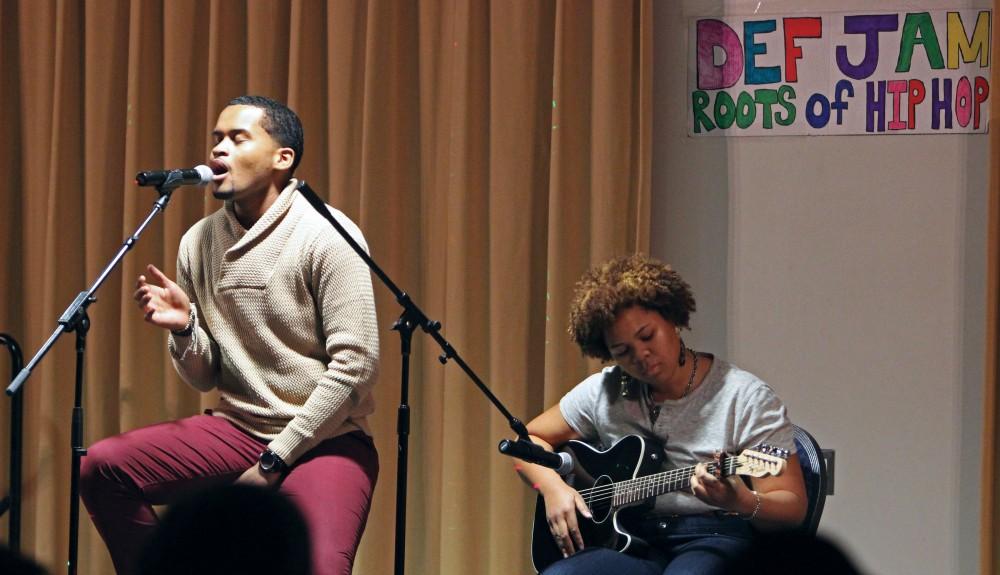Def Jam showcases the poetry behind rap

GVL / Laine Girard The National Association for the Advancement of Colored People (NAACP) hosted their 3rd Annual Def Jam event. Students performed their rendition of John Legend’s “All of Me.”
Nov 25, 2013
It may have been 18 degrees outside, but that did not stop students from traveling to Grand Valley State University’s Kirkhof Center on Saturday night. The relaxed crowd was made up of everyone from musicians to poetry lovers who had come to check out the third annual Def Jam hosted by the GVSU chapter of the National Association for the Advancement of Colored People.
“I am so proud of all of our performers, especially our student performers,” said Rebecca Williams, the secretary of the NAACP. “We really appreciate the support from (GVSU’s campus). We didn’t see (just) one ethnicity or one group in the audience. The turnout was really amazing.”
This year’s theme was the “Roots of Hip-Hop.” The show was meant to educate audience members on how hip-hop has transformed since its inception. The night showcased several student poets and musicians, alongside three featured performers: Marcel ‘Fable’ Price from Grand Rapids and two poets who have performed on Russell Simmons’ HBO series Def Jam: Gemineye and J. Ivy. Through these performances, the NAACP hoped to disassociate any negative connotations of hip-hop by showing how central poetry is to the art form.
“We coined that term from the actual HBO series, Def Jam,” Williams said. “(The show) was like slam poetry, but (musicians) like John Legend and different poetry artists would (perform). (Slam poetry is) a form of conscious rap—that’s where we made that connection to hip-hop.”
Conscious rap is meant to bring attention to social and political issues by imparting the speaker’s knowledge to further insight into these topics. Rappers like Common and Talib Kweli along with rap group Public Enemy are known for songs with insightful lyrics that aim to create awareness.
“Hip-hop (started out as) something active, to unify people to stand against oppression,” Williams said. “It’s interesting to see how it has transformed in society. (Def Jam) is a way to make people go back to that place of consciousness within music and in themselves.”
This year, three artists were featured. The first to perform was Price, who is part of the Grand Rapids-based spoken art collective, Diatribe. As a spoken word poet, he was featured in Art Prize 2013 along with Diatribe in an exhibit called “Word.” He currently co-hosts a poetry night called The Drunken Retort at Stella’s Lounge every Monday. The poet covered topics from poignant dreaming to his abusive stepfather.
“Hip-hop, to me, is about storytelling,” Price said. “People like Biggie, people like Tupac—they’re telling you about their stories, their struggles. That’s one of the most powerful (aspects) of hip-hop to me.”
The next featured poet, Def Jam veteran Gemineye, kept the crowd spellbound with his personal yet comedic spoken word poetry. The poet performed a series of poems written as letters to celebrities, such as Chris Brown, along with works he performed on HBO’s Def Jam, such as “Bloodlines.”
“I’m just a man with a pen and a God complex,” he said during his opening poem. “And I know I can change the world.”
The final performer of the showcase was Grammy award-winning hip-hop spoken word poet J. Ivy. Ivy has opened for a wide range of well-known artists, most notably collaborating with Kanye West and Jay Z on the track “Never Let Me Down” from West’s album The College Dropout (2004).
“You gotta do you,” Ivy encouraged the crowd. “That’s what you’re here to do. If you don’t deal with your emotions, one day your emotions are going to deal with you.”
Among the works that Ivy performed were poems that he read on HBO’s Def Jam, including “I Need to Write.” He closed the night reading a poem he wrote as a tribute to the complicated relationship he shared with his now-deceased father called “Dear Father.”
“It went really well,” Williams said. “People actually got the gist here that hip-hop has a poetry element. People understood that there’s not always negative associations with hip-hop.”























